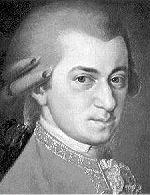 Mozart-1756-91
Mozart-1756-91
Began playing piano at age 3. Learned a piece in an hour, and a minuet in 30 minutes at age 4. He was composing by age 5, and played for
royalty throughout the courts of Europe at age 6. Exemplifies the classic period. The Requiem Mass was for his own soul, but he died before it's completion. (One of his students
completed it.) He was buried in an unmarked grave in St. Marks church, but is now lost.
 Mahler-1860-1911
Mahler-1860-1911
19th century romantic. Draws on his own life experience and heritige. He believed music and life are
interdependent. He was haunted by his childhood. His favourite brother died at age 13, and one
comitted suicide. A sister also later died. He had an accute consciousness of death. His melodies
have haunting purity and his music is made from the pain and suffering which in his eyes made up the
world. Mahler always considered himself to be 3x displaced- A Bohemian amongst Austrians, An Austrian amongst Germans, and a Jew amongst the world. The Resurrection symphony was inspired at the funeral of Has Von Bulows. (A german
conductor who stood in the way of his career) His death resurrected the career of Mahler as a
composer. He's known for unusual
harmonies, and while influenced by Beethoven (Esp 9th sym) said to have far surpassed him in his
compositions.
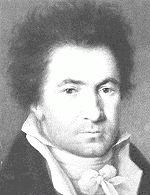 Beethoven-1770-1827
Beethoven-1770-1827
Influenced greatly by Mozart and Haydn- especially the later Mozart
symphonies. Typically wrote symphonies in C minor or E flat major, which were keys used by
Mozart. The Pastoral Symphony is in F major, taken from Haydn's seasons. Eroica influenced by
Mozart. He is unique for his slowing down of harmonic rhythms in his symphonies, and for his
projected tonal function into broader rhythms. His melodies have an instrumental root- not vocal.
The corolion Overture is for Collins tragedy- powerful like an explosion. The seventh, is powerful
and the principle melody comes out in the second movement. He was the ultimate of the Romantic
composers, known for the passion and power of his work.
 Tchaikovsky-1840-1893
Tchaikovsky-1840-1893
Often called a child of glass. He was prone to fits of neurosis, which was induced by the music which he loved. Became
increasingly encircled in gloom, which carried into his later works. Tried to commit suicide in 1877
by drowning after being trapped into marriage with a music student. He was saved by the wealthy
widow Nadezhada Von Meck who commissioned Tchaikovsky. They never consciously met, but he
was given an allowance by her. His wife died in an insane Assylum in 1896- she was sexually
deranged. His best works were composed during his acquaintance with the widow, and a
misunderstanding ended the friendship in 1890. Tchaikovsky Was nervous of change, and routine was a fetish. He was a nomad, and had a fear of conducting
as he believed his head would fall off. He kept a hand under his chin and kept his eyes closed while
conduucting to keep it attached. Symphony 6- Pathetique is his most celebrated and popular symphony, though it was originally
poorly received by the public. he destroyed the first sketches due to what he thought was lack of
quality.
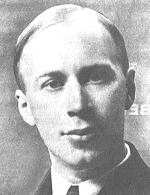 Prokefiev-1891-1953
Prokefiev-1891-1953
Studied with Rimsky Korsokov at St. Petersburg Conservatory.
Mother was pianist, he was child prodigy. Wrote first music at age five, and first opera at 9. Entered
conservatory at 13. Adopted modernistic stance. Was a disturbing man. Always said what he
thought and was ready with sarcastic remarks. Made sharp judgements on music and teaching methods
of instructors. Could be very savage if he disliked anybody. Influenced by Scryabin, Strauss and
Debussy. Had no discipline as a pianist. Disdained Classical repetoire, played Mozart and Schubert
with his own doublings- called them improvements. Stravinsky influenced his later works. Piano
Concerto #3 is one of his most widely performed concertos.
 Haydn-1732-1809
Haydn-1732-1809
Austrian. From Classical period. Friends with Mozart. Established form of stringquartet. His music is sane and healthy- he is the least neurotic . Symphony 45 farewell symphony
was a hint to Prince Nicholas that they wanted to leave castle. At the end, one by one snuffed out
candles and left the stage until two violins were left. Mozart's requiem played at Haydn's funeral.
 Saint-Seans-(1835-1921)
Saint-Seans-(1835-1921)
French composer. Was a child prdigy as a pianist. At age 10 he
appeared as a pianist in a Beethoven Violin Sonata. He was said to be the most brilliant musical
mind in Europe. His main influence was the Hungarian composer Franz Liszt. His early symphonies
resembled Beethoven's early symphonies, as well as some of the music of Mozart in manner, and
had the meticulous articulation of Mendlesshon in mood. His gift was for symphonic music. His
music is at it's purest in Carnival des animaux (famous for swan-violin piece) and he was allied to the
18th century composers. He composed his first piece at 3, and had perfect memory for pieces-he
could play anything instantly. Unique to France was a series of Concertos for piano and violin.
Acted as accompanist to Wagner, and his work has been played by great composers such as
Berlioz, Liszt, and Gounod. At age 33 he was decorated with the legion of honour.
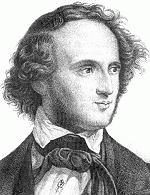 Mendelssohn-1809-1847
Mendelssohn-1809-1847
Mother gave him
rudiments of music. He made his debut as a pianist at age 9, and has been compared to Mozart. He
played concerts with his sisters and brother, and learned the violin at age 15. He studied with
Rossini. Most famous for A Midsummer Nights' Dream (Wedding March) written at age 17. In
1837 he was made the conductor and music director of Leipzig Gewandhaus, and he increased the
repetoire. Was friends with Chopin and Schumman. The Scottish symophony (#3) of 1842 was
dedicated to Queen Victoria. Also known for Italian symphony. (#4) His music is an expression of
emotion, and he surpassed Mozart in development. He was a great conductor, but comservatism
plagued his later career. Was a result of his upbringing by his Jewish banking family. Lived in
Anti-Semetic Berlin, and this made him anxious to be accepted, and gave him an air of caution. He
disliked the romantic composers, and initially distrusted the music of Chopin and Schumman, and he
hated Berlioz. Schumman thought he was perfect. He represents a purely classic style, as opposed to Liszt and the other
romantics. His early music experimented with some advanced harmonies, but he backed away. His
music influenced R.Strauss, Gounod, and Tchaikovsky. In 1847 he had a stroke upon hearing of his
sister's death, and died that year at age 38.
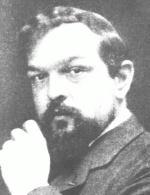 Debussy-1862-1918
Debussy-1862-1918
Had piano lessons in 1871 at 9 years old. From the Chopin deciple. Was
said to be in rage with the Piano. He was influenced by Borodin, Rimski Korsokov and
Tchaikovsky. Won Prix de Rome in 1884. He was self educated. WW1 made him stop composing
for a time, and when he resumed it was out of what he felt was a duty to his country. He is labeled
an impressionist composer, as he is linked with Monet's water colors. His insparations are pictoral,
and the compositions explore a world of waking dreams. He is the best french composer to ever
live. He fought Wagnerism, and detested the romantics and the classics like Beethoven and Mozart.
La Mer is closest to a symphony. Timbre, color and rhythm are important, but in his works they are
equal to harmony and melody. Images is an impressionist work.
 Schumman-1810-1856
Schumman-1810-1856
Romantic composer, obsessed with individual fantasy and romanticism. He died in an assylum. Mainly wrote
piano music, but scarcely wrote in the last five years of his life. (past 1850) Mood, suggestion and
allusion were important to Schumman. He had halucinations, and often heard harmonies which he
thought were from heaven.
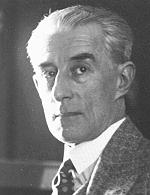 Ravel-1875-1937
Ravel-1875-1937
Was the most french of all the
composers. Began piano at age 7 with Henri Ghys. Studied harmony and Piano. In 1889 enrolled at
Paris Conservatoire and his principal teacher was Faure. Won 2nd prize in 1901 in prix de Rome.
Refused Legion d'honneur in 1920 because of still wounded pride, and a belief that music should not
be judged by the govt. in 1928 received honorary doctorate from oxford, and in this year composed
famous piece Bolero. Known for sliping out of concerts for what he called a "life saving puff" of a
cigarette or pipe. Felt that great music must come from the heart, and must first be emotional, and
then intellectual. Composed La Valse for Dighilev, but the music was never used. Hurt, when they
met he refused to shake hands. This insulted Dighilev, and he challenged ravel to a duel. They were
talked out of it, and never met again. Music for this piece stemmed from Strauss- was a hommage to
memory of waltz king. Influences were Lizst, Mozart, Saint-Seans. Ravel worked from theme
whereas Debussy worked from colors and textures. Ravel was precise, and an orthodox formalist.
Derived from classical and baroque models.
 Rachmaninoff-1873-1943
Rachmaninoff-1873-1943
Showed early interest in piano. Entered St. Petersburg Conservatoire in 1883 where he studied
harmony. Had absolute pitch. Loved Tchaikovsky- was linked in music and self-criticism. First
symphony was a disaster. He didn't publish it, and destroyed the manuscript. It wasn't heard again
until 1945. After a few months he wrote again with more success, and decided to write a new piano
concerto for his tour. Depression returned, and saw psychologist for treatment to restore
confidence. Hypnosis- You will start writing, and the work will be excellent. It was a great success.
When he played, he specialized in the romantics. Work is self expressive & has it's own identity.
Romantic Symphony #2 is one of most popular works.
 Chopin-1810-1849
Chopin-1810-1849
Chopin was half French/half Polish, and in 1820 he left Poland forever. He was a pianist and
composer. Settled in Paris in 1831 where he composed most of his music, and he taught piano privately and gave concerts. Was from the same era as Liszt, Berlioz, Bellini and Balzac,, and is well known for his liaison with the French Author George Sand. He mostly composed for the piano, and he wrote the score for the ballet Les Sylphides. Always of ill health, he fled to England in 1848 giving public recitals to earn a living. In 1849 he went back to Paris where he finally died.
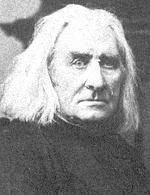 Liszt-1811-1886
Liszt-1811-1886
Also a pianist and composer. He began the piano when he was 6, and by age 9 he was already composing and giving concerts. In 1821 thanks to wealthy patrons he waas able to continue his studies in Vienna, and finally in 1823 he settled in Paris. Went through a spritual crisis at his father's death, and began to teach piano while living with his Mother. He met Chopin in 1832, and began a ten year relationship with Marie d'Agoult who left her husband for Liszt. In 1840 he began a new relationship with the Princess Carolyne Sayn-Wittengstein and settled in Weimar Germany to be with her. It was there he seriously began composing.
He was an associate of Wagner, and in 1870 his daughter married Wagner. Until his death he traveled and gave advice to many young composers including Greig and Debussy, and he died of pneumonia during his travels.

To read some of my favourite musical quotes and for a list of classical music links, see my QUOTES PAGE.
Click here now to return to the first page.
Or, visit my Unofficial National Ballet of Canada Pages

This page hosted by